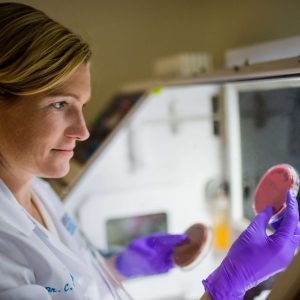VINCENT CENTER FOR REPRODUCTIVE BIOLOGY
Into the Clinic
In translational research, investigators work to find solutions in the lab, then translate these findings into novel treatments offered to patients in clinical studies. Results of these clinical trials are used to define future patient treatments. Below is a sampling of clinical studies emerging from findings initially made in the VCRB laboratory.

Investigating Placental Immune Activation
Lydia Shook, MD, a Maternal-Fetal Medicine subspecialist in the Vincent Department of OB/GYN at Mass General, in 2021 was appointed an investigator in the Vincent Center for Reproductive Biology (VCRB), a funding priority of the Vincent Memorial Hospital Foundation (VMHF). Her lab research aims to understand how the placenta mediates the impact of maternal obesity and nutrition on the developing fetus, focusing on the activation of placental immune factors. With the emergence of COVID-19, Vincent OB/GYN researchers now are using the same core concepts to investigate the virus’s impact in pregnancy, creating a biorepository of tissues collected from mothers and their newborns who have or are at risk of COVID-19 to investigate how the virus alters the immune response of the placenta. Recent projects also have explored the impact of COVID-19 vaccination in pregnancy and transfer of immunity to the newborn. Her VCRB appointment followed a three-year Vincent fellowship, demonstrating how the VMHF’s support of 12 fellowships in four OB/GYN subspecialties is shaping new leaders to advance women’s health.
Publications
- Maternal SARS-CoV-2 infection elicits sexually dimorphic placental immune responses.
- COVID-19 mRNA vaccines drive differential antibody Fc-functional profiles in pregnant, lactating, and non-pregnant women.
- Countering COVID-19 vaccine hesitancy in pregnancy: The “4 Cs.”
- COVID-19 vaccination in pregnancy and lactation: current research and gaps in understanding.

Maternal Obesity and Brain Deficits in Offspring
Andrea Edlow, MD, MSc, an OB/GYN subspecialist in Maternal-Fetal Medicine who joined the VCRB in November 2017, is studying how maternal obesity influences fetal brain development and the behavior of offspring. Population studies have shown the offspring of obese women are at increased risk for autism, ADHD, anxiety, depression and neurodevelopmental delay, but the underlying mechanisms have been largely unknown. Her lab was one of the first to use amniotic fluid and umbilical cord blood to study real-time brain development in fetuses of obese pregnant women. She found the genes expressed in these biofluids were associated with increased inflammation and impaired regulation of processes needed for normal brain development. Working in obese pregnant mouse models, she now is examining fetal brain tissue, the levels of neurotransmitters and the neurobehavior of their offspring, that is, how quickly they learn to find a platform in a pool of water or how social they are when presented with an unfamiliar mouse. Preliminary findings suggest that maternal obesity has sex-specific effects on the offspring: Males are more likely to have certain prenatal brain changes that correspond with learning and memory deficits as adults, while females are more likely to have abnormal neurotransmitter signaling in brain regions that control eating throughout the lifespan and are more likely to become obese themselves. Dr. Edlow hopes this work will ultimately provide targets for lifestyle interventions and prenatal drug therapies for obese pregnant women to potentially reverse or ameliorate harmful changes that may occur in the fetal brain.
Learn More
Publications
- Assessing the fetal effects of maternal obesity via transcriptomic analysis of cord blood: a prospective case-control study.
- Males are from Mars, females are from Venus: sex-specific fetal brain gene expression signatures in a mouse model of maternal diet-induced obesity.
- Maternal obesity affects fetal neurodevelopmental and metabolic gene expression: a pilot study.

Role of Microbes in Women’s Vaginal Health
Caroline Mitchell, MD, MPH, a VCRB investigator, is studying how microbial changes in the vagina and urinary tract lead to health complications across the lifecycle of women. The human vagina is normally dominated by one bacterial species — Lactobacillus. When that population is disrupted by the emergence of other types of bacteria, it causes bacterial vaginosis. Symptoms range from the unpleasant including vaginal itching, odor or discharge, to the far more serious including increased risk of contracting sexually transmitted infections, difficulty conceiving, and higher risk of premature delivery and low birth-weight. Her research has shown these more serious complications are caused by inflammation, for which she is seeking treatments. To that end, Dr. Mitchell is working to develop an in vitro model of vaginal tissue to allow pre-clinical testing of new therapies. In collaboration with colleagues at the Ragon Institute, she used an early version of this model to help confirm the inflammatory potential of certain vaginal bacteria associated with a higher risk of acquiring HIV. Among recent clinical studies, she compared three options to relieve postmenopausal vaginal discomfort — a low-dose estrogen vaginal tablet, a nonprescription moisturizer, and a placebo gel — and found similar improvements for all three groups, pointing to the need to understand the underlying biology of what causes symptoms. Her lab is currently analyzing biologic samples from that study to help explain the results. At the other end of the lifespan, she is working with investigators at the Broad Institute to better understand how the vaginal microbiota of pregnant women influence the infant gastrointestinal microbiome, as prior studies have shown that being born vaginally leads to a different gastrointestinal bacterial community than being born via C-section.
Learn More
Publications
- Efficacy of vaginal estradiol or vaginal moisturizer vs. placebo for treating postmenopausal vulvovaginal symptoms: a randomized clinical trial.
- Lactobacillus-deficient cervicovaginal bacterial communities are associated with increased HIV acquisition in young South African women.
- Vaginal microbiota and genitourinary menopausal symptoms: a cross-sectional analysis.
